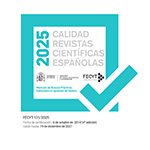Una percepción de la idea de Europa en España durante el periodo de entreguerras 1918-1939.
Abstract
Europa se convertiría en el referente inexcusable de la España del primer tercio del siglo XX. El «noventayochismo» proyectó el debate acerca de la modernización de nuestro país sobre un espejo europeo roto, poco después, por la barbarie de 1914-1919. Tras la contienda, la contribución de algunos intelectuales españoles, en especial Ortega y Gasset, a la construcción de Europa como espacio integrador y superador de viejos contenciosos, fue más importante de lo que habitualmente estimamos, según se expone en estas páginas.Downloads
Article download
License
In order to support the global exchange of knowledge, the journal Cuadernos de Historia Contemporánea is allowing unrestricted access to its content as from its publication in this electronic edition, and as such it is an open-access journal. The originals published in this journal are the property of the Complutense University of Madrid and any reproduction thereof in full or in part must cite the source. All content is distributed under a Creative Commons Attribution 4.0 use and distribution licence (CC BY 4.0). This circumstance must be expressly stated in these terms where necessary. You can view the summary and the complete legal text of the licence.











